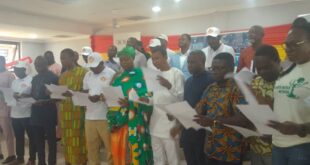Nigeria has over the past 18 years recovered $4.6 billion (1.4trn) allegedly looted from the nation’s treasury and stashed abroad by the late Head of State, Gen. Sani Abacha. Data on the recoveries collated by Daily Trust indicates that the funds were repatriated mainly from four countries between 2002 and 2020 under the administrations of Olusegun Obasanjo, Goodluck Jonathan and Muhammadu Buhari.
The countries include Switzerland, Jersey Island in the United Kingdom, United States of America and Liechtenstein.
Under the administration of former President Olusegun Obasanjo, $1.2 billion was recovered in 2002; $149 million from Jersey Island, the UK in 2003; $500 million recovered in 2004 from Switzerland and another $458 recovered in 2005 from Switzerland.
During the Goodluck Jonathan administration, $1 billion was recovered in 2012 and $380 million in 2015, both tranches from Switzerland. The Jonathan administration also recovered $227 million from Liechtenstein in 2014 and $48 million from the United States the same year.
President Muhammadu Buhari’s government recovered $322 million from Switzerland in 2017 and $308 million from Jersey Island, United Kingdom in February 2020, being the latest.
Of the four countries, Switzerland tops the list of countries where the funds were recovered from.
A total of about $2.6 billion of the funds so far repatriated to Nigeria was recovered from Switzerland while the other recoveries came from UK and USA. Switzerland was the principal recipient of funds allegedly stolen under the Abacha regime. However, there are concerns that funds so far recovered may have been ‘re-looted’ or mismanaged by those at the helms in Nigeria.
Last week, an agreement was signed by the federal government, the government of Jersey and the United States to repatriate $308m of such funds to Nigeria, under some conditions.
The agreement which the Attorney-General of the Federation and Minister of Justice, Mr. Abubakar Malami, signed behalf of Nigeria, tied the return of the funds to three major projects across Nigeria.
The projects include the Lagos-Ibadan Expressway (Western Region), Abuja-Kano Road (Northern Region), and Second Niger Bridge (Eastern Region).
Conditional transfer
Negotiations for the return of the funds which began in 2018, according to the agreement, specifically indicated out who will manage the assets and the various organisations that would monitor the expenditure to ensure that they are not diverted to other purposes.
The tripartite agreement reads in part: “The projects on which the funds will be expended will be administered by the Nigeria Sovereign Investment Authority and independently audited. The Federal Republic of Nigeria will establish a monitoring team to oversee the implementation of the projects and report regularly on progress.
“The Nigerian government, in consultation with the other parties, will also engage civil society organisations which have expertise in substantial infrastructure projects, civil engineering, anti-corruption compliance, anti-human trafficking compliance, and procurement to provide additional monitoring and oversight.”
The attachment of the conditions was blamed on the poor accountability and high level corruption in the country, especially that previous repatriated funds were said to have been stolen.
The latest fund to be repatriated was looted through the US but was recovered and confiscated in Jersey Island at the request of the US government.
The funds were laundered through the U.S. banking system and then held in bank accounts in Jersey in the name of Doraville Properties Corporation, a British Virgin Islands company, and in the name of a son of the ex-military ruler.
“This agreement has culminated in a major victory for Nigeria and other African countries as it recognizes that crime does not pay and that it is important for the international community to seek ways to support sustainable development through the recovery and repatriation of stolen assets,” Malami said after the agreement was signed.
He said the funds would be administered by Nigeria’s sovereign wealth fund and used to develop roads that will boost supply chain connections and economic growth.
The Swiss government in 2017 said it would return to Nigeria about $321m in assets seized from Abacha’s family via a deal signed with the World Bank.
In a separate news release, the U.S. Department of Justice said it was seeking to enforce forfeiture judgments for approximately $30m in assets located in Britain and more than $144m in France.
The moves to recover the funds started just after former President Olusegun Obasanjo got to office in 1999.
In April 2002, the Abacha family returned $1bn to the federal government in a deal which involved the Swiss Federal Office of Justice.
The deal allowed the family to keep $100m and required the government to drop “some criminal charges” against Mohammed, Mr Abacha’s son, New York Times then reported.
According to Transparency International (TI), in 2006, another $723m was returned to Nigeria from Switzerland but was largely unaccounted for.
“That past experience led Switzerland to controversially attach conditions to the repatriation of this batch of $322 million in 2018, including third party oversight – meaning that the World Bank will now monitor the distribution of the funds,” TI said.
A Swiss court in December 2014, ruled that the Swiss government should repatriate the funds on condition that the World Bank would monitor its use.
This was followed by the federal government, the Swiss Federal Council and the World Bank Memorandum of Understanding (MOU) on December 4, 2017, capturing the tripartite agreement on the World Bank’s monitoring role and the modalities of the fund’s repatriation and disbursement.
While the World Bank’s role is limited to monitoring the use of the funds, the responsibility for the use of the funds is with the federal government.
Previous arrangements
In 2005-2006, the funds were returned directly from Switzerland to the Nigeria and were programmed into the national budget and utilized by the Nigerian government in line with its National Economic Empowerment and Development Strategy (NEEDS).
At that time, at the request of, and in agreement with the Nigerian and Swiss governments, the World Bank carried out an ex-post analysis on the use of the repatriated funds, particularly in terms of the contribution for these funds to NEEDS.
The bank’s analysis took a two-pronged approached looking at general budget expenditure trends at the macro level while also conducting a field survey of randomly selected projects funded under the budget program. Its role was limited to analyzing spending of repatriated funds after they were disbursed, and had no role in supervising the implementation.
In addition, in order to provide independent monitoring of the use of the funds, Nigerian Civil Society Organizations under the umbrella of the Network on Asset Recovery (NAR) made up of civil society organizations with expertise in anti-corruption and asset recovery will monitor the use of the funds for cash to beneficiaries and provide bi-annual reports on the use of the funds.
US warning
The United States warned Nigeria to be prepared for repayment if the latest $308m in question about to be released to the country was stolen again.
The spokesperson for the US State Department, Morgan Ortagus, in a statement said this was part of the deal with the Nigerian authorities before the Island of Jersey where the funds are being kept, agreed to its repatriation.
“The funds will be used by the Nigerian Independent Sovereign Authority for three infrastructure projects in strategic economic zones across Nigeria.To ensure that the funds are used responsibly and for the good of the nation, the agreement includes mechanisms for monitoring the implementation of these projects as well as external oversight, and it requires Nigeria to repay any funds lost as a result of any new corruption or fraud to the account established to hold the returned assets.
“This return reflects the growing international consensus that countries must work together to ensure stolen assets are returned in a transparent and accountable manner.This agreement is a symbol of the weight that the United States government places on the fight against corruption,” he said.
The US said they welcome President Muhammadu Buhari’s personal commitment and would continue to support civil society and other Nigerian efforts to combat corruption at all levels, as the fight against corruption is an investment in the future of Nigeria.
Reactions
In one of the earliest reactions, a human rights lawyer, Mr. Femi Falana, advised President Buhari to reject Switzerland’s conditions for the return of $321m loot. Falana said the condition given by the Swiss government, which allows the World Bank to supervise the spending of the returned assets, breaches international law.
Falana urged the federal government to collaborate with relevant civil society organizations to mount campaigns locally and internationally to ensure full compliance by Switzerland, the United States and other countries with international law principles of accountability, sovereignty, equality, fairness and non-interference.
Also, the Civil Society Legislative Advocacy Centre (CISLAC) and the Transparency International’s chapter in Nigeria, expressed concern about a lack of parliamentary and public approval of the distribution scheme.
CISLAC’s Executive Director, Auwal Musa Rafsanjani, said the center had repeatedly called for a trust fund to be set up to manage the repatriated assets, and other assets seized within Nigeria. According to him, repatriated assets from abroad account for only 10 to 15 percent of all assets seized since 2015.
“We are supporting the government in this recovery but with the condition that there must be an establishment of integrity trust fund that would manage this money and assets. We want to ensure that we have an institutional framework that would monitor the recovered assets in Nigeria,” Rafsanjani said.
Source: Daily Trust
 Home Of Ghana News Ghana News, Entertainment And More
Home Of Ghana News Ghana News, Entertainment And More






